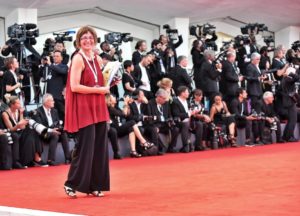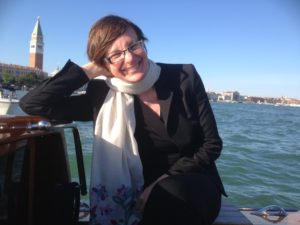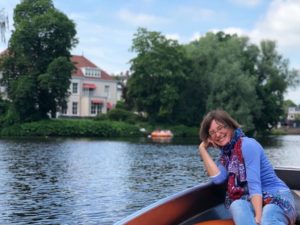A readership survey we issued way back in January 2018 showed that alumnae wish to read more about the lives and achievements of fellow alumnae in Europe. Below is our fifth feature interview, focusing on Laura Aimone class of ’04.
Please get in touch if you feel your story would be of interest, or would like to recommend a fellow alum!
Spotlight on… Laura Aimone Class of ’04
The 2020 Venice Film Festival, the first major film festival post-Covid to take place completely “live” this year, saw the triumph of “Nomadland”, a film directed by Mount Holyoke alumna Chloé Zhao ’05 (see end).
While Chloé could not attend the festival and receive her prize in person, another MHC alumna, Laura Aimone ’04, was very much present on (and behind!) the Venetian red carpet, using her professional talents and expertise to ensure the success of the event.
Laura, a talent handler, festival organizer, and film director, has been working in the film industry for many years. Her intellectual curiosity and love for travel and adventure have brought her all over the world, but our alma mater still holds a special place in her heart.
Read more about her exciting professional life and her memories of Italian Gracious Dinners at Ham Hall in this latest interview in our ‘In the Spotlight’ series.

Name: Laura Aimone
Class Year: 2004
Major: Foreign Languages & Literatures
1) Can you tell us a few words about yourself?
At a conference, I would introduce myself like this: my name is Laura Aimone, I was born and raised in Piemonte in the north-west of Italy, I chose to live in Venice, but I spend most of my time travelling the world; I’ve worked in the film industry for the past 15 years. If we were sipping a Nilgiri white tea from the Blue Mountains in an Indian teahouse, I would tell you: Namaste, my first ever friend was a foreigner, I’ve always been attracted to cultures other than mine and to listening to different stories; just like the main character of the first short film I wrote and directed last year is learning, I’m trying to live my life leaving the “what if” aside and just going for it. If we were in front of a canvas, I would use a mix of orange, red, pink and dark yellow, with dots of marine blue and green.
2) Was there a particular event or time that you recognized that being in the film industry would be your life and your living?
When I graduated in Foreign Languages and Literatures in 2004 I knew exactly which elements my dream job should have: international context, the possibility to travel and to be in touch with different cultures, a very strong connection with the arts, interesting and stimulating people around, organizational elements. I was just not sure this job existed! After some rambling around between international holiday resorts in Egypt and the Dominican Republic and a teaching fellowship at Mount Holyoke College, the teacher I had graduated with asked me if I was willing to give a hand to the Director of the Women’s Film Festival in Torino, who was looking for someone who could speak English. I still remember the feeling on the first day of work: it was exactly like when you enter a house for the first time and you just know that’s exactly where you want to live.
3) How did you break into the film industry? Did you have a particular role model that pushed you/inspired you/or challenged you to conquer your fears?
By being persistent. It was certainly not easy at first as I had no connections in the industry whatsoever, but it suited me so perfectly, that I had no doubt I was just in the right place. To be honest, I did not have one specific person as role model. I constantly try to connect with those who surround me, finding inspiration at all levels, from a simple conversation at a water bus stop with a stranger to the most profound discussion with a psychologist met by chance in an onsen in Japan.

4) What’s your favorite part of your job and why do you love working in the film industry?
Without any doubt, the chance to meet likeminded people from all over the world and to be surrounded by stimulating minds. This happens when I’m working as talent handler on red carpets, when I’m discussing the logistics of a Festival with agents/pr managers, when I’m interviewing a director during a Q&A session, when I’m on set shooting my own film and, more indirectly, when I’m selecting films for a Festival program or watching them as part of the Festival jury. No matter how long you’ve done it for, it is a job that can always surprise, challenge and enrich you. Dull moments are just not contemplated, the only downside is it’s addictive!
5) What films have been the most inspiring or influential to you and why?
The ones I did not want to watch. I still remember that at uni there was a monographic course about western movies that had never been on my radar before and made me very skeptical. Needless to say, I fell in love with that course, which certainly fueled my passion for cinema. From that moment onwards, I’ve always tried to be adventurous in my own film choices, pushing myself out of my comfort zone. You never know which jewels might be hiding out there!
6) What’s one challenge you faced over the course of the years and how did you manage to overcome it?
The lack of continuity and the constant need of looking for new opportunities. This was not easy to face when I started being a freelancer, but I had already experienced that having a fixed job in this sector was not working for me. So, little by little, I created my own agenda of collaborations throughout the year that more or less (and Covid permitting!!!) keep repeating, while leaving room for new additions. There is also no website where you can look for vacancies, so networking is fundamental.
7) Did you have a vision of your career when you were at Mount Holyoke? How did that vision change over the years?
When I was at Mount Holyoke I still had not discovered what exactly I wanted to do when I would “grow up”, but no matter what I would end up doing, it was imperative for me to do it with passion. One of my goals in life has always been to wake up and be happy to go to work, so I have tried to tailor made my job around my biggest passions. This has been the leitmotiv throughout my whole career with the result that, in most cases, the boundaries between doing it for pleasure or doing it for work are blurred. How lucky is that?

8) What is your most fond memory of your time back at MHC?
Uh, this is a tough one and I hope you will allow me to give more than one answer. Taking part in the exchange organized by MHC and spending my first Thanksgiving with an ex alumnae in Maine was unforgettable to the extent that I’m still in touch with this family now, after almost 20 years. Organizing the Italian Gracious Dinner together with the MHC staff and chefs and sharing part of my culinary culture with the exceptional women I had met there, the students and the teachers of the Italian Department. I am still in touch with some of the Italian teachers (Ombretta Frau, current Chair of Romance Languages and Cultures, to name one), the other language fellows and international students and we regularly meet up around the world. Attending Professor Michael Davis illuminating architecture classes while outside it was snowing. What I learnt from him has been an indispensable travel companion since then and I will always be thankful for that.
9) How did your MHC experience contribute to your career aspirations?
Well, first of all it was thanks to my position as language fellow at MHC and to the small events related to Italian culture that I had to organize throughout the academic year that I consciously realized how much I enjoyed events management. Besides, being immersed in an environment that was fostering the creation of future leaders contributed to my setting my career goals always a bit higher and it allowed me to shoot for positions at the Venice Film Festival or the Berlinale, just to name two, and to get them. In a way, when three years ago I decided to create and run an annual event dedicated to films about women and sports, Shocking Pink Endorphins, I still wanted to be somehow surrounded by charismatic and powerful ladies like back then.
10) What advice would you give to young women today who want to break into the film industry?
Always give it a shot, the worse that can happen is to receive a “no”. But if it’s a “yes”, then you’re one step closer to your goal. And never be afraid of letting people know what you’re looking for and where you want to go. Maybe someone is heading the same direction and is willing to give you a ride.
11) What are 3 movies that should be on every MHC alum’s “must watch” list?
On Body and Soul by Hungarian director Ildikó Enyedi, because it is the strongest and most poetic love story you have ever watched, happening in the most unlikely place where a romance can unfold: a slaughter house. The Garden of Words by Japanese animation director Makoto Shinkai, an incredible portrayal of a special friendship that develops only on rainy days… because we all need to learn how to walk again, at some point of our lives. The Ignorant Fairies by Turkish/Italian director Ferzan Özpetek, because of his unique way of perceiving my country and with the hope that, sooner or later, we can all meet our “ignorant fairy” that will teach us to look at new worlds, not even slightly imagined at first glance.
Interview conducted October 2020 by Dimitra China ’16 and Delia Youssef ’15
On the topic of alums making waves in the film industry… the film Nomadland should go straight to the top of your Must Watch list once it’s released in December:
Last September, at the 77th Venice Film Festival, the first A-list festival to happen since lockdown, Nomadland by MHC graduate Chloé Zhao was awarded the Golden Lion for best film, shortly followed by the People’s Choice Award at the Toronto Film Festival.
Zhao thus becomes only the fifth female director – after Sofia Coppola, Mira Nair, Agnès Varda and Margarethe von Trotta – to win Venice’s top prize.
The film portrays the story of Fern, a strong minded and free spirited lady, who, following the economic collapse of a company town in rural Nevada, packs her van and sets off on the road exploring a life outside of conventional society as a modern-day nomad. Frances McDormand’s performance is extraordinary and she fluidly melts in with the real nomads in the film that serve as mentors and comrades in her adventure through the vast landscape of the American West.
It is a subtle exploration of loss and grief, but also a celebration of how much little details and trivial encounters can add colours to the shades of grey. Ultimately, it is a hymn to a lady who seems to know herself very well and always looks ahead, even when the road is not pointing anywhere.
Nomadland is scheduled to be theatrically released in the United States on December 4, 2020.